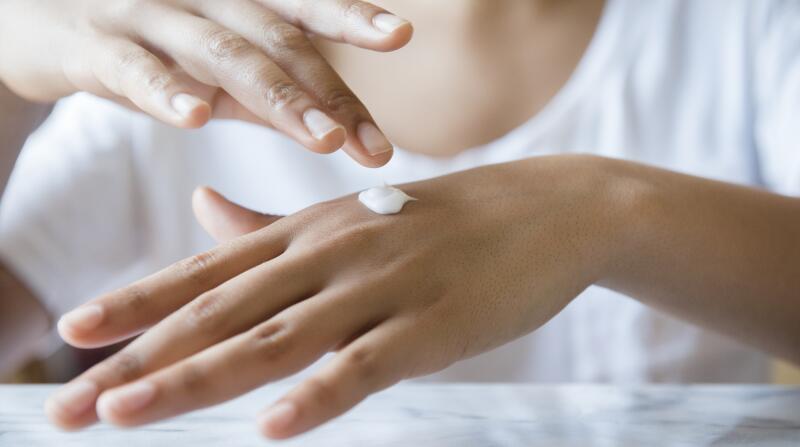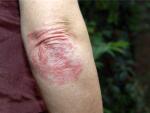8 Ingredients That May Irritate Sensitive Skin

Medically Reviewed By William C. Lloyd III, MD, FACS
Written By Jennifer Larson on October 25, 2021
-
 Sensitive Skin Irritants to AvoidIf you have sensitive skin, you’re all too familiar with skin irritation. For example, you might develop a skin rash called contact dermatitis when you come into contact with certain chemicals or compounds. You probably already have a mental list of ingredients to avoid because you know they’ll trigger a reaction. But if you’re not sure what tends to irritate your skin, it might be worth a closer look at typical sensitive skin triggers.
Sensitive Skin Irritants to AvoidIf you have sensitive skin, you’re all too familiar with skin irritation. For example, you might develop a skin rash called contact dermatitis when you come into contact with certain chemicals or compounds. You probably already have a mental list of ingredients to avoid because you know they’ll trigger a reaction. But if you’re not sure what tends to irritate your skin, it might be worth a closer look at typical sensitive skin triggers. -
 1. PreservativesPreservatives can be very bothersome to skin, but they’re hard to avoid. Manufacturers put preservatives in many common household products, like lotions, cosmetics, and skincare products, to keep them from spoiling too quickly. But people with sensitive skin may find that certain preservatives can make their skin red, itchy, or blotchy. Fortunately, more and more brands are offering preservative-free products. If you’re trying to determine if your lotion or makeup contains preservatives, look out for commonly used ones like methylisothiazolinone and formaldehyde.
1. PreservativesPreservatives can be very bothersome to skin, but they’re hard to avoid. Manufacturers put preservatives in many common household products, like lotions, cosmetics, and skincare products, to keep them from spoiling too quickly. But people with sensitive skin may find that certain preservatives can make their skin red, itchy, or blotchy. Fortunately, more and more brands are offering preservative-free products. If you’re trying to determine if your lotion or makeup contains preservatives, look out for commonly used ones like methylisothiazolinone and formaldehyde. -
-
 2. FragrancesYou love the way that your favorite laundry detergent or new body lotion smells, but you just can’t tolerate the way that it treats your skin. Experts note that fragrance is a very common culprit of skin irritation. Before you buy a new shampoo or soap, read the label. Look for phrases like “no added fragrance” and “fragrance-free,” but be forewarned: some products labeled as “unscented” contain scent-masking agents that can still irritate your skin.
2. FragrancesYou love the way that your favorite laundry detergent or new body lotion smells, but you just can’t tolerate the way that it treats your skin. Experts note that fragrance is a very common culprit of skin irritation. Before you buy a new shampoo or soap, read the label. Look for phrases like “no added fragrance” and “fragrance-free,” but be forewarned: some products labeled as “unscented” contain scent-masking agents that can still irritate your skin. -
 3. Essential OilsPlenty of people swear by essential oils for a number of purposes, but other people find that certain essential oils tend to irritate their skin. For example, bergamot oil can make your skin extra sensitive to the sun, a condition known as photosensitivity. And some people find that mint oils, like wintergreen and peppermint, go beyond “refreshing” into the “irritating” category. If you choose to use essential oils, just be cautious. Some of these oils or other essential oils may irritate your skin, too.
3. Essential OilsPlenty of people swear by essential oils for a number of purposes, but other people find that certain essential oils tend to irritate their skin. For example, bergamot oil can make your skin extra sensitive to the sun, a condition known as photosensitivity. And some people find that mint oils, like wintergreen and peppermint, go beyond “refreshing” into the “irritating” category. If you choose to use essential oils, just be cautious. Some of these oils or other essential oils may irritate your skin, too. -
 4. NickelHave you ever donned a bracelet, only to find an itchy red rash on your wrist after wearing it? Certain metals, notably nickel, can cause skin reactions in certain people. If you’re sensitive to nickel, you may want to avoid wearing any kind of jewelry that isn’t specifically made to be nickel-free.
4. NickelHave you ever donned a bracelet, only to find an itchy red rash on your wrist after wearing it? Certain metals, notably nickel, can cause skin reactions in certain people. If you’re sensitive to nickel, you may want to avoid wearing any kind of jewelry that isn’t specifically made to be nickel-free. -
 5. SurfactantsWhen you’re doing laundry, you’re usually focused on getting your clothes clean. But if you have sensitive skin, you should also consider the possibility that the detergent residue might irritate your skin when you wear the clean clothes later on. Detergent often contains a number of potentially irritating chemicals, including surfactants, which lift the oils and dirt out of the fabric so it can be easily washed away. Watch out for surfactants in facial cleansers and other products, too. They can dry out your skin and make it tight and itchy.
5. SurfactantsWhen you’re doing laundry, you’re usually focused on getting your clothes clean. But if you have sensitive skin, you should also consider the possibility that the detergent residue might irritate your skin when you wear the clean clothes later on. Detergent often contains a number of potentially irritating chemicals, including surfactants, which lift the oils and dirt out of the fabric so it can be easily washed away. Watch out for surfactants in facial cleansers and other products, too. They can dry out your skin and make it tight and itchy. -
-
 6. AmmoniaMany household cleaning products are full of chemicals that can potentially irritate anyone’s skin, but especially sensitive skin. One of the worst offenders? Ammonia. This chemical is a reliable presence in products like window cleaner, but if you plan to use it, you might want to don a pair of gloves first, as it’s common to experience a skin reaction.
6. AmmoniaMany household cleaning products are full of chemicals that can potentially irritate anyone’s skin, but especially sensitive skin. One of the worst offenders? Ammonia. This chemical is a reliable presence in products like window cleaner, but if you plan to use it, you might want to don a pair of gloves first, as it’s common to experience a skin reaction. -
 7. Hydrochloric Acid and LyeJust about anything you use to clean your home could potentially contain chemicals that irritate your skin. Some common culprits are hydrochloric acid and lye, so try to avoid those chemicals if you can. If you are worried about protecting your skin, keep a pair of rubber gloves on hand to wear while you clean.
7. Hydrochloric Acid and LyeJust about anything you use to clean your home could potentially contain chemicals that irritate your skin. Some common culprits are hydrochloric acid and lye, so try to avoid those chemicals if you can. If you are worried about protecting your skin, keep a pair of rubber gloves on hand to wear while you clean. -
 8. PABAPara-aminobenzoic acid, or PABA, is a common ingredient in many sunblocks and sunscreens. But some people find that it stings their skin, or it makes their skin look nearly as red and irritated as a sunburn would. Look for “PABA-free” on the labels of sunscreen if you fall into this category. If you struggle with sensitive skin, narrowing down your triggers is an important step to find relief. Try to avoid the ingredients listed and talk to your dermatologist if you have further concerns.
8. PABAPara-aminobenzoic acid, or PABA, is a common ingredient in many sunblocks and sunscreens. But some people find that it stings their skin, or it makes their skin look nearly as red and irritated as a sunburn would. Look for “PABA-free” on the labels of sunscreen if you fall into this category. If you struggle with sensitive skin, narrowing down your triggers is an important step to find relief. Try to avoid the ingredients listed and talk to your dermatologist if you have further concerns.
Sensitive Skin | Skin Irritation





























